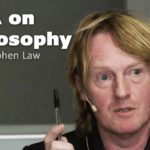I get that speaking to students, young people and the uninformed is boring. But they are the people who will really get this country addressing the issues you care about.
A few years ago, I just started to wake up to the problems within Islamism and cultural relativism. This left me in a rather awkward position as I did not relate to the far right individuals who were discussing the matters on my mind. Similarly, I didn’t think I could discuss these issues critically with my left wing associates.
As a vulnerable 18 year old, I was very lucky to have found the network to guide me through that stage. I found a group that was centrist; critical of authoritarianism at both ends. I could talk about my views without being shouted down as ‘regressive’ or ‘radical.’
I’d learn here: I’d read, discuss, research and analyse things instead of blindly following cult figures. I feel that if I hadn’t had contacts with these think tanks I might have fallen into the ignorant alt-right. In a way, this discourse prevents extremism.
I owe an awful lot of that to a brilliant young man at an organisation which works around radicalism and extremism. Charismatic, charming and open minded, this man formed a dialogue with the awkward student populace who might not have raised their voice before. We were a real mix; quiet, young, white women, disillusioned Asian men, virulent secularists and liberal Jews, as well as moderate Muslims.
We probably wouldn’t have mixed in a dialogue space if we hadn’t been shaken up by our shared desire for a progressive discourse. Waving a pen in one hand and a cigarette in the other, this young activist created a whole network of people showing there was another way for students to think. In that year alone, I spoke about gay rights, sexism, misogyny, racism and terrorism with a huge range of individuals, and learnt how to hold a debate without resorting to labels, anger and division.
That was what made being part of a think tank great: learning and sharing ideas with a group of people who would then go out and spread the message of tolerance, discourse and discussion. I went from being an ignorant, disillusioned teenager to someone who knew the difference between Islam and Islamists, and immigration and invasion.
However, a few years on, the cracks began to appear in this utopia; the focus of the group shifted. Our youth movement was left floundering as the think tank moved away to bigger, more important networks of politicians, scholars and academics. From my opinion, this was not only the wrong thing to do, but disastrous.
I understand that there is a draw to speak to ‘important’ people. I would love to speak to the PM or appear on a documentary as much as anyone. You could also argue that think tanks should be talking to the people who really matter and can change things. TV is seen by a lot more people than a meeting ever could be, right?
The problem here is that when you only move among politicians and academics who know all about quietist-Salafi interpretations of Salat or the exact Arabic for half a Surah, you don’t speak to the thousands of young people, or less educated, who don’t understand these words, but desperately need to be included in the debate for change. We aren’t going to sit through Question Time listening to a bunch of old academics and politicians we don’t relate to argue slickly over suited collars. We need to engage ourselves with the debate itself, not just watch it.
I strongly believe that a lot of young British white people, and British Asians, could be less disillusioned and angry with the state if they were allowed to make those stumbling, awkward steps into the political sphere. I know it was boring for you to listen to me come to the wise realisation that, ‘Some ideas on tradition are bad, actually,’ but no one will make that step without someone to guide them and engage with them.
It makes me genuinely angry to see the people I once admired refusing to acknowledge or associate themselves with lay people who depend on a debate to understand. However much you get paid for an interview, however much press you get through talking to that back-bencher Conservative MP, as an activist, your discourse must centre on what is right for the movement, whatever you campaign for. And this is always to engage with those who need a network, a debate centre and a progressive life-line away from fascism or militant jihadism. Talk to them and they will listen; discuss with them and they will understand.
I know this article might well cost me some very dear friends, potential job offers and networks, but I fear for the future of think tanks, as well as my generation, if there is not room for ordinary people to engage with them. I have been taught by phenomenally talented scholars and those who never finished primary school – they all have a lot to offer.
However boring, dull or ordinary we are, please talk to us. You could be our step towards progression.





Article Discussion